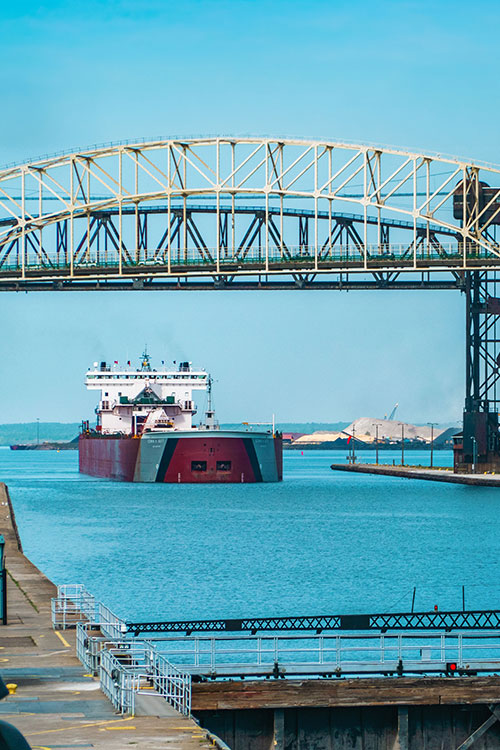
Michigan’s Efficient Transportation Systems
MEDC Communications
Tuesday, March 5, 2024
With recent substantial investments in road, air and water infrastructure, Michigan is paving the way for its businesses to thrive. The state’s Infrastructure Office is at the core of this initiative, spearheading ambitious goals and dedicated efforts to enhance transportation efficiency through Bipartisan Infrastructure Law (BIL) and Michigan’s supplemental infrastructure investment funds. Evident through the state’s strategic strides towards comprehensive infrastructure support, Michigan companies are positioned for success whether on land, water or in the air.
PAVING THE WAY
Enhancing the state’s transportation networks is a top commitment for Michigan; in fact, the infrastructure section of Governor Gretchen Whitmer’s state budget has earmarked $3.5 billion in investment in Michigan’s road conditions, reflecting an overall commitment to enhancing the state’s transportation networks. Since Governor Whitmer took office, Michigan has fixed 20,000 lane miles of road and 1,400 bridges – one of the costliest components – while supporting more than 118,000 jobs.
State investment in road improvements is complemented by the existing industry’s rollout of mobility technology on Michigan roads. Numina, a Michigan-based curb-level activity monitor company, will deploy sensor technology in Detroit's Corktown neighborhood to create more walkable, bikeable and accessible streets. Meanwhile, DTE Energy and Daimler Truck North America are spearheading the development of a “Truck Stop of the Future” mobility charging hub.
These strategic steps underscore a broader commitment to sustainable, innovative transportation solutions that enable businesses and residents to thrive in Michigan. “Mobility isn’t just about planes, trains and automobiles. That’s why Michigan is thinking holistically about how people and goods move across the state and pursuing opportunities to use mobility solutions as a catalyst to create better living experiences,” said Justine Johnson, Michigan’s Chief Mobility Officer.

EFFICIENCY FLOWS
Michigan is pioneering efforts to decarbonize its waterways, allocating over half a million dollars in state investments toward this transformative goal. This groundbreaking initiative focuses on deploying e-boats and charging stations at marinas across Northwest Michigan, providing significant benefits for businesses relying on Michigan’s water routes. Governor Whitmer emphasizes the program's significance: "Expanding access to e-boats and charging solutions will not only support local businesses but also cultivate a thriving mobility ecosystem, enhance community offerings, and drive overall economic growth.” The allocation of funds includes support for Voltaic Marine, Inc., an Oregon-based startup specializing in high-performance electric water sports boats, to explore Michigan-based strategies for advanced manufacturing, battery chemistry, propulsion and job creation in emerging technologies.
 In parallel, Michigan continues to demonstrate its commitment to upgrading crucial water infrastructure with significant investments in the Soo Locks, a vital component of the Great Lakes navigation system. Governor Whitmer's announcement of these investments highlights the strategic importance of the locks in facilitating trade and economic cooperation between Michigan's peninsulas and its Great Lakes neighbors. The Soo Locks are essential conduits for freighters transporting agricultural products and materials crucial for manufacturing and military operations, emphasizing their indispensable role in regional and national commerce.
In parallel, Michigan continues to demonstrate its commitment to upgrading crucial water infrastructure with significant investments in the Soo Locks, a vital component of the Great Lakes navigation system. Governor Whitmer's announcement of these investments highlights the strategic importance of the locks in facilitating trade and economic cooperation between Michigan's peninsulas and its Great Lakes neighbors. The Soo Locks are essential conduits for freighters transporting agricultural products and materials crucial for manufacturing and military operations, emphasizing their indispensable role in regional and national commerce.
Michigan's dedication to enhancing its water infrastructure, as outlined through initiatives such as Make it in Michigan, reflects its proactive approach to economic development, underscoring the critical significance of these investments in sustaining local economic vitality and ensuring the seamless operation of key trade routes. By investing in water systems, Michigan not only addresses immediate needs but also fortifies the viability of ongoing and future projects, such as those in cutting-edge manufacturing and supply chain optimization. This strategic approach creates long-term economic opportunities, from automobile manufacturing to semiconductor production and renewable energy.
AIRBORNE CONNECTIVITY
Michigan’s air transportation efficiency is taking off with a focus on cargo airports and evolving capacity trends. This commitment to efficient air transit is enhanced by the work of industry leaders like Lufthansa Cargo and Avflight, who are making critical improvements to their cargo operations at Detroit Metropolitan Airport by relocating their warehouse to an on-airfield cargo facility. The driving force behind this effort was Lufthansa Cargo's recognition of Avflight as a fitting local partner with aspirations for growth in the cargo industry. Detroit, a significant location for Lufthansa Cargo due to its handling of over 500 tons of cargo annually through seven weekly passenger flights and other provided services, stands as a crucial hub in the mobility-centric region of Michigan, offering the potential for further expansion. This project, planned over three years, showcases two businesses capitalizing on Michigan's strategic location and leveraging local partnerships to help achieve the state’s air infrastructure improvement goals.
In terms of aeronautics mobility, Michigan remains at the forefront, ensuring that its air transportation system aligns with the demands of its people and businesses. The Michigan Department of Transportation (MDOT) Office of Aeronautics initiated an effort to update their statewide Airport Pavement Management System for 98 airports across the state with ongoing inspections each year. As a result of this initiative, Michigan facilitates optimal commercial service and aviation flights, supporting residents, visitors and businesses in transporting people, goods and services within and beyond the state.

ELECTRIFYING MICHIGAN’S INFRASTRUCTURE SYSTEM
Contact a business development specialist to learn more about Michigan’s robust infrastructure and how you can be a part of the future of transportation.
Contact Us
To contact a business development specialist, click here or call 1.888.522.0103.
